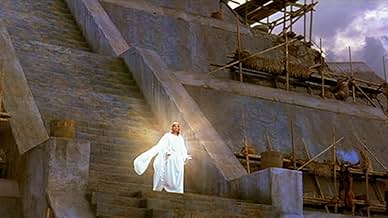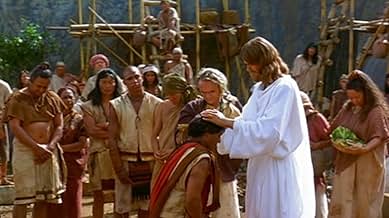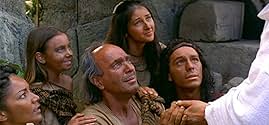CALIFICACIÓN DE IMDb
7.8/10
926
TU CALIFICACIÓN
En América, Helam ve la estrella del nacimiento de Cristo y espera su llegada. Su hijo Jacob se aleja de la fe. Tras la crucifixión de Jesús, Zarahemla cae en tinieblas mientras Helam busca ... Leer todoEn América, Helam ve la estrella del nacimiento de Cristo y espera su llegada. Su hijo Jacob se aleja de la fe. Tras la crucifixión de Jesús, Zarahemla cae en tinieblas mientras Helam busca a su hijo.En América, Helam ve la estrella del nacimiento de Cristo y espera su llegada. Su hijo Jacob se aleja de la fe. Tras la crucifixión de Jesús, Zarahemla cae en tinieblas mientras Helam busca a su hijo.
- Dirección
- Guionista
- Elenco
Jeremy Hoop
- Jacob
- (as Jeremy W. Hoop)
Tomas Ambt Kofod
- Jesus Christ
- (as Tomas Kofod)
- Dirección
- Guionista
- Todo el elenco y el equipo
- Producción, taquilla y más en IMDbPro
Opiniones destacadas
I can't say truly that I have seen very many movies that I would go back and enjoy seeing over and over again consistently. However, after viewing this particular movie, I can. It is a movie about inner struggles, repentance, love, and best of all, faith. When there is no place else to turn and you are confused, you can turn to our Savior and Redeemer. With an ending that will literally leave you in a pile of tears, this movie is superb. Probably the best by far!
I read a comment on here saying that this film was awful. I honestly can't say I understand the logic behind that comment. It is a fantastic missionary movie (and I know because I know of people who saw it, and they became interested in the LDS church.) And also, it is a movie that can relate to us in our day; it can relate to how we struggle inside to find the truth.
TWO THUMBS WAY UP!
I read a comment on here saying that this film was awful. I honestly can't say I understand the logic behind that comment. It is a fantastic missionary movie (and I know because I know of people who saw it, and they became interested in the LDS church.) And also, it is a movie that can relate to us in our day; it can relate to how we struggle inside to find the truth.
TWO THUMBS WAY UP!
At the risk of being accused of speaking evil of the Lord's anointed, I have to say that this film represents poor judgment on the part of the LDS leaders who conceived and approved it.
Over the years, the LDS Church has made some fine missionary films: "Man's Search for Happiness," "Together Forever," "How Rare a Possession," "The Mountain of the Lord," "Legacy." True, these films are emotionally heavy-handed. They're not calculated to win praise for their subtlety, or irony, or ambiguity, or provocativeness, or originality, or any of the other qualities that make for great cinema by the standards of literary criticism. But these films aren't trying to meet those standards. They're proselyting tools. And judged by the standards of that genre, I think the films I've listed above are well-conceived and well-made.
I cannot say the same for "Testaments." This film is to the Book of Mormon what "The Ten Commandments" is to the Book of Exodus or what "Ben Hur" is to the Gospels--and I don't intend those to be flattering comparisons. I'm reminded of a comment made by a character in LDS playwright Eric Samuelsen's drama "Gadianton": "It is pretty awful. I mean, that book's supposed to be scripture, and they turn it into this cheesy melodrama."
In the south visitors center on Temple Square, they used to show a short film that, like "Testaments," set scenes from Christ's ministry in the Old World (as described in the Gospels) side-by-side with scenes from his ministry in the New World (as described in the Book of Mormon). The film was moving and did a fine job of presenting the Book of Mormon as Christ-centered and as a companion volume to the Bible. Most importantly, in my opinion, this film presented the Book of Mormon with the dignity owed to a sacred text.
In "Testaments," that dignity is seriously compromised. What we get in "Testaments" is part scripture, part romance, part courtroom thriller, part political thriller, part disaster flick, part family values entertainment, and part Indiana Jones-style adventure.
Dare I say that this film represents the literatures of men mingled with scripture?
Walking into "Testaments" today (my second viewing), I heard an LDS teenager ahead of me say that she's seen this film six times. Afterwards, I heard this same teenager and her mother commenting, between sniffles, on how the ending always "gets them." OK. So the film's a tear-jerker. If I want to see a good tear-jerker, I can go to my local cineplex or video rental store. A good missionary film has to do more than make people cry. What I want to know is: Does "Testaments" convince non-LDS viewers to take the Book of Mormon seriously as a sacred text? Does it inspire viewers--LDS or non-LDS--to live more Christlike lives?
Let me clarify: I have nothing per se against fictionalizations of scripture, and I believe that God is great enough to touch people's lives even through cheesy fictionalizations of scripture. I haven't heard any yet, but I'm sure testimonials are forthcoming from people whose lives were transformed by this film.
But a fictionalization of scripture is not scripture. "The Ten Commandments" is not the Book of Exodus. "Ben Hur" is not the Gospels. "Testaments" is not the Book of Mormon. It should therefore not be used in place of the Book of Mormon, which is exactly what's happening every time this film is screened. People who ought to be watching a film designed to showcase the spiritual power of the Book of Mormon are instead being shown a fictionalization of the Book of Mormon designed to make them cry. They're being cheated.
Over the years, the LDS Church has made some fine missionary films: "Man's Search for Happiness," "Together Forever," "How Rare a Possession," "The Mountain of the Lord," "Legacy." True, these films are emotionally heavy-handed. They're not calculated to win praise for their subtlety, or irony, or ambiguity, or provocativeness, or originality, or any of the other qualities that make for great cinema by the standards of literary criticism. But these films aren't trying to meet those standards. They're proselyting tools. And judged by the standards of that genre, I think the films I've listed above are well-conceived and well-made.
I cannot say the same for "Testaments." This film is to the Book of Mormon what "The Ten Commandments" is to the Book of Exodus or what "Ben Hur" is to the Gospels--and I don't intend those to be flattering comparisons. I'm reminded of a comment made by a character in LDS playwright Eric Samuelsen's drama "Gadianton": "It is pretty awful. I mean, that book's supposed to be scripture, and they turn it into this cheesy melodrama."
In the south visitors center on Temple Square, they used to show a short film that, like "Testaments," set scenes from Christ's ministry in the Old World (as described in the Gospels) side-by-side with scenes from his ministry in the New World (as described in the Book of Mormon). The film was moving and did a fine job of presenting the Book of Mormon as Christ-centered and as a companion volume to the Bible. Most importantly, in my opinion, this film presented the Book of Mormon with the dignity owed to a sacred text.
In "Testaments," that dignity is seriously compromised. What we get in "Testaments" is part scripture, part romance, part courtroom thriller, part political thriller, part disaster flick, part family values entertainment, and part Indiana Jones-style adventure.
Dare I say that this film represents the literatures of men mingled with scripture?
Walking into "Testaments" today (my second viewing), I heard an LDS teenager ahead of me say that she's seen this film six times. Afterwards, I heard this same teenager and her mother commenting, between sniffles, on how the ending always "gets them." OK. So the film's a tear-jerker. If I want to see a good tear-jerker, I can go to my local cineplex or video rental store. A good missionary film has to do more than make people cry. What I want to know is: Does "Testaments" convince non-LDS viewers to take the Book of Mormon seriously as a sacred text? Does it inspire viewers--LDS or non-LDS--to live more Christlike lives?
Let me clarify: I have nothing per se against fictionalizations of scripture, and I believe that God is great enough to touch people's lives even through cheesy fictionalizations of scripture. I haven't heard any yet, but I'm sure testimonials are forthcoming from people whose lives were transformed by this film.
But a fictionalization of scripture is not scripture. "The Ten Commandments" is not the Book of Exodus. "Ben Hur" is not the Gospels. "Testaments" is not the Book of Mormon. It should therefore not be used in place of the Book of Mormon, which is exactly what's happening every time this film is screened. People who ought to be watching a film designed to showcase the spiritual power of the Book of Mormon are instead being shown a fictionalization of the Book of Mormon designed to make them cry. They're being cheated.
Whether or not it is spiritually uplifting is left to the viewer.
However, as a film, everything about it is pretty mediocre, especially the acting. The music and sound design are nauseating too. It is a competent movie with pretty cool costumes and engaging sets, but I'm baffled as to how this has an 8.0 (at least rn).
This short movie just can not be described with words. When watching this movie, especially at the end, tears were forming in my eyes and I felt a closeness to Christ that I can vividly remember to this day. It has inspired me to be a better person as I was able to witness the love of Christ like no other movie. I encourage anyone to watch this movie - whether you are a member of The Church of Jesus Christ of Latter Day Saints or not. I guarantee you will not be disappointed and you will feel Christ's presence in your heart and be touched. I believe it is still showing in many of the Church's Visitors Centers but may be replaced with a new one that is coming out about Joseph Smith on or around Dec. 24, 2005. See it, before it goes away!
Not to say that being a Mormon, or, more correctly, a member of The Church of Jesus Christ of Latter-day Saints is wrong; however, those not familiar with LDS tenets and fundamental doctrines journeying to see this film in Salt Lake City, Utah, or who potentially see it via LDS acquaintances will most likely not be as riveted by the emotionally charged film as those who are. It certainly is meant to rivet and inspire, not to prod our intellect or demand art house enthusiasts'attention, and as most transcendent works it will seem either too sentimental or downright saccharine, but it is so because it caters to an audience whose faith is cradled in its lofty content, such as the visit of Christ to the Americas. For those inclined to study LDS beliefs, and to grasp the exultant joy and adulation they feel for Jesus Christ, this film is a dramatic example of their faith. For those wanting to dive into intellectual quandaries and secular cinematic debate, there are more appropriate venues.
¿Sabías que…?
- TriviaMany of The Savior's scenes in The Holy Land are based on pictures and paintings that are popular among the members of The Church of Jesus Christ of Latter Day Saints.
- ErroresThe crucifixion scene in the film is totally wrong as a Jew from the crowd nails Jesus to the Cross and not a Roman Soldier.
- ConexionesEdited into Finding Faith in Christ (2003)
Selecciones populares
Inicia sesión para calificar y agrega a la lista de videos para obtener recomendaciones personalizadas
Detalles
- Tiempo de ejecución
- 1h 7min(67 min)
- Color
- Relación de aspecto
- 2.20 : 1
Contribuir a esta página
Sugiere una edición o agrega el contenido que falta












